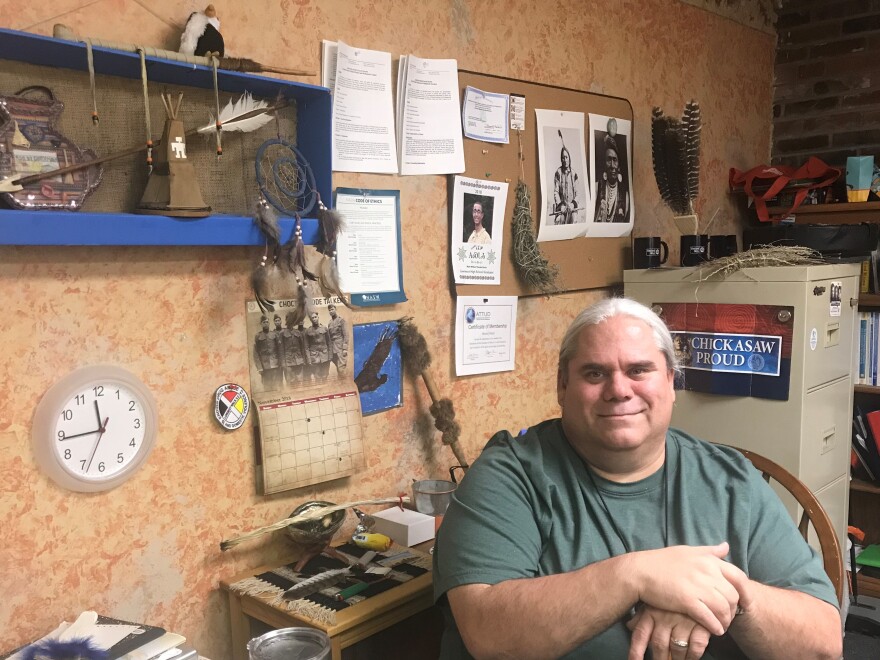One in five Americans deals with a mental health issue. However for people of color, being a person of color itself takes a toll on mental health.
Studies show that discrimination and microagressions can negatively effect the health of blacks, Hispanics, Indigenous people and Asians.
All of this is made harder by there being a small number of mental health providers of color for those hardest hit to turn to, says Kirby Randolph, an assistant professor who teaches the history of medicine at the Kansas City University of Medicine and Biosciences.
“African Americans have manifested some of the worst stress-related conditions in terms of high blood pressure and heart disease,” Randolph says. “That’s why I think it’s so important for African Americans to know that help is available, know how to ask for help, know where to go to get help with any kind of depression or anxiety and with stress and coping skills.”
Randolph, who's black, has had trouble over the years locating professionals of color as she's dealt with depression and anxiety.
“When I’m in therapy," she says, "I would not want to get into defending my perceptions of racism with my provider."
Randolph says that if a black therapist questions her perception, she’ll have more trust that it's being asked from an understanding place.
A recent study shows white mental health providers have a bias and are slower to take on new patients of color because of their assumptions. Randolph isn’t surprised.
"Therapists in private practice, it’s safe to say, serve the 'worried well,' which are most of us who are middle class, have private insurance and we have anxiety and depression," she says. "And to the extent that a therapist feels like they have a good grip on how to handle that."
If a white mental health provider feels they can not adequately help a patient deal with issues in life influenced by race, Randolph says, the ethical thing to do would be to suggest another provider.
Megh Chakrabarti, a social worker and disability advocate of Indian American descent, believes that people of color seeking mental health help are being underserved.

She has helped start an online group that provides resources for people of color health providers to find each other and provide recommendations. The group is invitation-only.
“You find patients or clients wanting practitioners that are also of color. Why?," asks Chakrabarti.
"While people don’t have to have the same lived experiences as your therapists or as your counselor, clinician, social worker, that’s not a requirement, but as we’re finding more and more, it’s a pretty hostile world out there for folks of color right now and maybe what wasn’t a requirement or even a request previously is now something we’re seeing a lot of."
National research by the American Psychological Association in 2015 showed that 85 percent of psychologists were white.
Trust is the biggest bridge to cross for all patient-therapist relationships, Chakrabarti says, but particularly for people of color. Recent political events and social realities make that increasingly necessary.
“I think the problem is now for folks of color, how do you trust the person that’s on the other side,” says Chakrabarti.
Many white mental health professional also see the benefit of her network, she says.
“White clinicians, white advocates, white social workers are saying 'God, how can we meet this need, we need safe spaces for folks of color,'” Chakrabarti says.

Patrick Pruitt, a mental health professional with the Indian Center of Kansas City, says culture can't be separated from treatment.
“Someone who is Native American, they’re going to be more comfortable if someone is like-minded and like them, understands the spirituality, understands some of the norms, such as aunties and mothers and fathers in several different nations, grandparents play a very important role," says Pruitt. "A lot of those things are very similar to white culture and some of them are very different."
It's important that Native American clients not be talked down to by white therapists because of lack of cultural understanding, Pruitt says. It’s important to ask questions and take an interest.
“Did you go to church last week, did you go to sweat lodge last week? Did you go to peyote meeting last week? You take an interest in that because their spirituality is a huge component of their healing for mental illness and for substance abuse disorder,” Pruitt says.
Michelle Tyrene Johnson is a reporter at KCUR 89.3 and part of the public radio collaborative Sharing America, covering the intersection of race, identity and culture. This initiative, funded by the Corporation for Public Broadcasting, includes reporters in Kansas City, St. Louis, Hartford, Connecticut and Portland, Oregon. She can be contacted at michelle@kcur.org.


